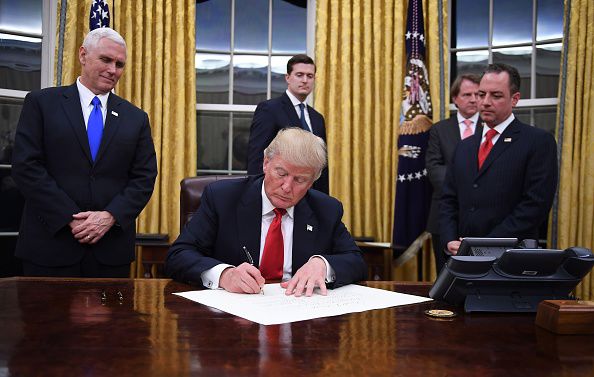Iowa State professor says North Korean summit lacked progress

President Donald Trump signs a document on the Resolute Desk in the Oval Office.
June 12, 2018
An Iowa State political science professor says the North Korea summit, which aimed to denuclearize the Korean peninsula, ended without a real deal being made.
Professor Richard Mansbach, who specializes in international relations, says the deal in which North Korean Supreme Leader Kim Jong Un agreed to give up his nuclear capabilities will be unenforceable, unverifiable and gives up too much in return.
While the fine details of the deal itself are not available, a picture of Trump holding up signed documents revealed four key points.
In exchange for “complete denuclearization of the Korean Peninsula,” Kim would receive “security guarantees” from the U.S.
In addition to the security guarantees, the U.S. promised not to expand or create any new sanctions on North Korea. This came in conjunction with promises from Japan, China and South Korea to provide economic assistance if North Korea accepted a deal.
The signed letter also revealed a promise from the U.S. to stop joint military exercises with South Korea, a move that “blindsided Japanese and South Koreans,” Mansbach said.
“The Japanese and South Koreans likely had no idea this was going to be a part of the deal,” Mansbach said. “This arrangement seriously lowers the credibility of the American deterrent and brings into question whether the United States will stay in east Asia.”
Mansbach says the deal is not creating progress in terms of Kim’s nuclear capabilities.
“The devil is in the details, or lack thereof,” Mansbach said. “We have no fine details on what the deal consists of, and the agreement from Kim to completely denuclearize is unverifiable and could take decades.”
The picture of the agreement, in fact, does not include the commonly used phrase and primary objective of Trump administration officials: “complete, verifiable and irreversible denuclearization.”
Rather, Kim’s commitments are similar to commitments made in April when Kim met with South Korean President Moon Jae-in at their countries’ border.
Mansbach sees this aspect of the deal as a failure.
“This deal is like giving your opponent a couple of runs before the baseball game even starts,” Mansbach said in reference to what the U.S. gives up for North Korean promises.
Mansbach also took issue with the ambiguity of the term denuclearization.
Trump has said denuclearization should include North Korea eliminating all of their estimated 20 to 60 nuclear devices, the ability to make the warheads and all of the missiles that could be used to carry a device across the Pacific Ocean prior to the summit.
In a press conference following the summit on monday, Trump pivoted slightly saying North Korea would remove its nuclear devices “as fast as it can mechanically and physically be done,” (which could take upwards of 10-15 years) and he did not mention whether verifying the denuclearization was still a part of the deal.
Mansbach says the ability to verify denuclearization in North Korea would take a level of observation unachievable for the time being.
“The North Koreans have closed down facilities in the past by caving in the mountainous areas needed to access them,” Mansbach said. “They can easily reverse these collapses, and under current circumstances, [North Korea] could just tell the U.S. not to observe certain mountains while simultaneously building up their arsenal in hidden locations.”
President Trump has a more positive view of how North Korea will react.
“I think our whole relationship with North Korea and the Korean Peninsula is going to be a very much different situation than it has in the past,” Trump said during the summit.
Some, including Mansbach, have criticized Trump for being cordial and friendly towards Kim who has been accused of thousands of human rights abuses.
When pressed by reporters at the summit about Kim’s abuses, Trump responded.
“He is very talented,” Trump said. “[He took] over a situation like he did at 26 years of age and run it, and run it tough.”
Mansbach says improving relations could be good but the costs associated overshadow any benefits.
“It is obviously in our best interest to reduce tensions,” Mansbach said. “But it is certainly not within America’s best interest to do so while the other side is quietly amassing a larger arsenal.”






